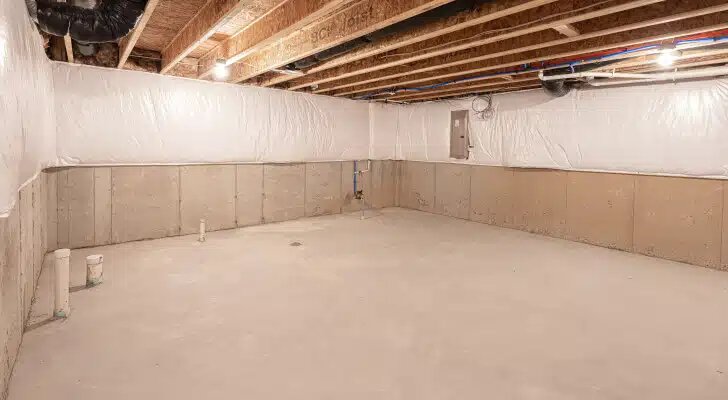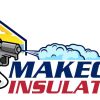Insulating Your Home’s Basement: What You Need to Know

Basement insulation is often an overlooked aspect of home energy efficiency, but it plays a critical role in maintaining indoor comfort, reducing energy bills, and preventing moisture issues. Insulating your home’s basement can significantly improve the overall thermal performance of your house, helping to create a more consistent indoor environment throughout the year. Whether you use your basement as a living space or simply for storage, proper insulation is essential to protect against temperature fluctuations and moisture buildup.
In this blog post, we’ll cover everything you need to know about basement insulation, including its benefits, different insulation types, and how to inspect and maintain it for maximum effectiveness.
Why Insulate Your Basement?
Insulating your basement offers numerous benefits, not only for comfort but also for protecting your home’s structural integrity. Here are some key reasons to consider basement insulation:
1. Improved Energy Efficiency
Basements are one of the most significant sources of heat loss in a home. Without proper insulation, cold air can seep in during the winter, and hot air can enter during the summer, causing your HVAC system to work harder. Insulating your basement can help reduce heat transfer, lowering your energy consumption and resulting in lower utility bills.
2. Moisture Control
Basements are prone to moisture problems due to their proximity to the ground. Without proper insulation, moisture can build up in your walls, leading to mold and mildew growth. Insulating your basement helps create a barrier against water vapor and condensation, protecting your home from dampness and related damage.
3. Increased Comfort
A properly insulated basement makes the space more comfortable year-round, whether it’s used as a living area or simply for storage. Insulation prevents cold floors in the winter and keeps the basement cool in the summer, making it a more usable and pleasant space.
4. Extended HVAC System Life
Insulating your basement reduces the strain on your heating and cooling systems by minimizing temperature fluctuations and air leaks. This can extend the life of your HVAC system, leading to fewer repairs and replacements over time.
5. Enhanced Home Value
Homes with insulated basements are generally more energy-efficient and comfortable, which can increase their market value. Potential buyers often view insulated basements as a positive feature, knowing it helps maintain a stable indoor climate and lower energy bills.
Types of Basement Insulation
Choosing the right type of insulation for your basement depends on factors like your climate, budget, and whether you plan to finish the basement. Here are some common insulation options:
1. Fiberglass Insulation
Fiberglass is one of the most common types of insulation for basements. It’s made from fine glass fibers and comes in batts or rolls. It’s affordable and relatively easy to install, making it a popular choice for homeowners. However, it’s important to ensure fiberglass insulation is installed with a vapor barrier to prevent moisture issues.
2. Rigid Foam Insulation
Rigid foam boards are an excellent choice for insulating basement walls and floors. They offer a high R-value (thermal resistance) and provide moisture resistance. Rigid foam insulation is ideal for unfinished basements and can be installed on both the interior and exterior of walls. It’s a durable, long-lasting solution that can prevent heat loss and moisture problems effectively.
3. Spray Foam Insulation
Spray foam insulation expands to fill gaps and crevices, providing both thermal insulation and air sealing. It’s an excellent choice for irregularly shaped areas or hard-to-reach places. Spray foam has a high R-value and provides an effective moisture barrier, making it ideal for basements prone to humidity. While more expensive than other options, it offers superior performance and long-term energy savings.
4. Foam Board Insulation
Foam board insulation is similar to rigid foam but typically comes in thinner panels. It’s lightweight and provides good moisture resistance, making it a practical choice for basements. Foam board can be installed between studs in the wall or directly on the foundation for an extra layer of insulation.
5. Mineral Wool Insulation
Mineral wool, also known as rock wool, is a natural insulation material that offers excellent fire resistance and moisture control. It’s a great option for basement insulation, particularly in areas prone to dampness. Mineral wool is also resistant to pests, mold, and mildew, making it a durable choice for long-term insulation.
How to Inspect and Maintain Your Basement Insulation
Once you’ve installed insulation in your basement, it’s essential to regularly inspect and maintain it to ensure it remains effective over time. Here are some tips on how to inspect and maintain your basement insulation:
1. Check for Moisture or Mold
Moisture is one of the biggest threats to basement insulation. Regularly inspect your basement for signs of water damage, such as damp walls, mold, or mildew. If you notice any moisture issues, address the source of the problem immediately, whether it’s a leak, condensation, or improper drainage. In areas with high moisture levels, consider using moisture-resistant insulation like rigid foam or spray foam.
2. Inspect for Air Leaks
Air leaks can significantly reduce the effectiveness of your insulation. Check for drafts or gaps around windows, doors, and foundation walls. If you detect any leaks, seal them with caulk or weatherstripping to prevent air from escaping or entering your home.
3. Monitor Insulation Settling
Some types of insulation, particularly fiberglass, can settle over time, reducing their insulating properties. Periodically inspect your insulation to ensure it hasn’t shifted or compressed, especially if you’ve noticed a decrease in your home’s energy efficiency. If necessary, add more insulation to maintain optimal performance.
4. Watch for Pests
Pests like rodents can sometimes nest in insulation materials, particularly in basements. Keep an eye out for any signs of pest activity, such as droppings or chewed insulation. If you notice pests, contact a pest control professional to remove them and assess any damage to your insulation.
5. Replace Damaged Insulation
If your basement insulation has been damaged by water, pests, or age, it may need to be replaced. Damaged insulation loses its effectiveness and can lead to moisture problems, higher energy bills, and decreased comfort. When replacing insulation, consider upgrading to a more durable material like spray foam or rigid foam.
FAQs about Basement Insulation
1. How do I know if my basement insulation is effective?
You can assess your basement insulation’s effectiveness by checking for drafts, uneven temperatures, or increased energy bills. If your basement feels cold in the winter or warm in the summer, it may be a sign that your insulation needs to be upgraded.
2. Can I insulate my basement myself?
While some types of insulation, such as fiberglass batts, can be installed by homeowners, other types, like spray foam, are best left to professionals. A professional insulation contractor can ensure that your basement insulation is installed correctly and meets local building codes.
3. What is the best type of insulation for basements?
The best type of insulation for your basement depends on your specific needs. Spray foam insulation is an excellent choice for areas prone to moisture, while rigid foam insulation offers superior thermal performance. Fiberglass is a more affordable option but requires a vapor barrier to prevent moisture damage.
4. Can I insulate my basement walls from the outside?
Yes, insulating basement walls from the outside is possible and can provide additional moisture protection. Exterior insulation, such as rigid foam boards, can help reduce thermal bridging and prevent water infiltration into your basement.
5. Does basement insulation prevent mold?
Proper basement insulation, combined with moisture control, can help prevent mold growth by reducing condensation and moisture buildup. Insulating with materials like spray foam or rigid foam can create a barrier that blocks water vapor and helps keep your basement dry.
Conclusion
Insulating your home’s basement is one of the best investments you can make for improving energy efficiency, comfort, and moisture control. Whether you choose fiberglass, spray foam, or rigid foam insulation, ensuring your basement is well-insulated will help keep your home comfortable year-round and protect it from potential moisture damage.
For homeowners in Atlanta, GA, and surrounding areas such as Gwinnett County, Dekalb, Fulton, Forsyth, Cobb, Hall, Walton, Barrow, Cherokee, Rockdale, and Clayton counties, Makeover Insulation offers expert insulation services to help you maximize your home’s efficiency and comfort.
Call Makeover Insulation today at (470) 664-5300 to schedule a professional basement insulation consultation and ensure your home is properly insulated!

